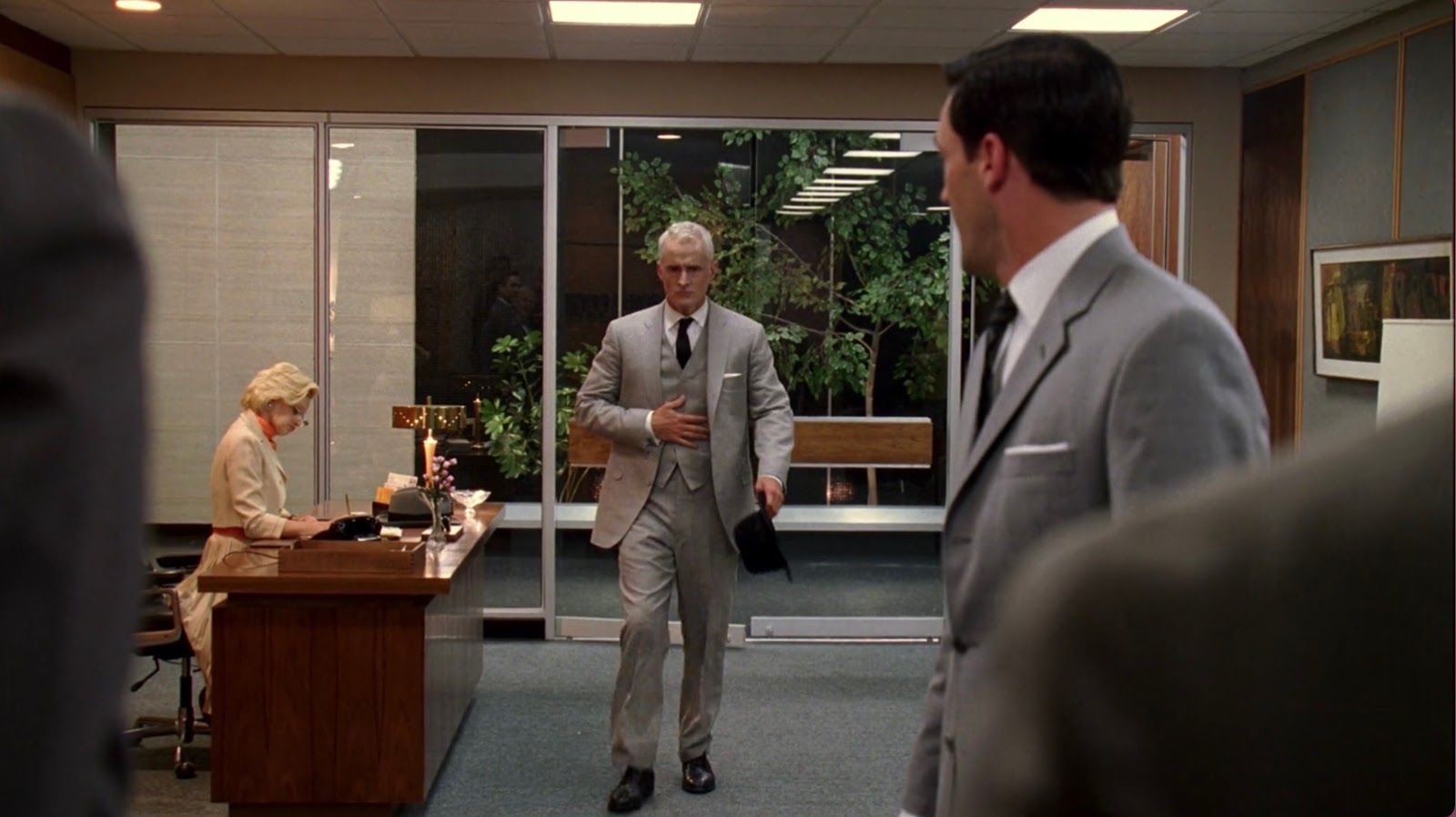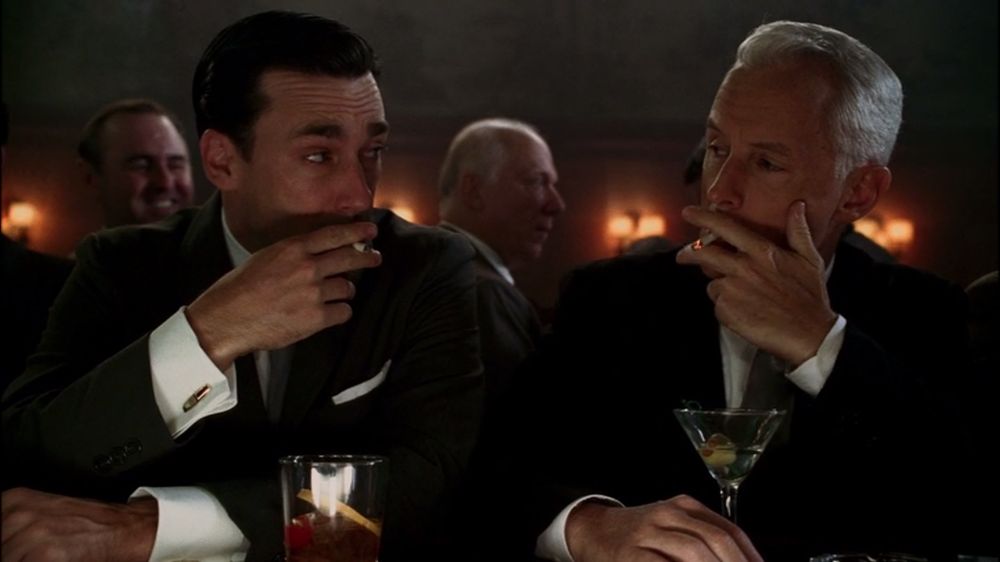Mad Men S1E7 — Red In The Face
Each Monday we watch an episode of Mad Men (available on Amazon Prime) and put together notes on what we can learn from it about running agencies. Read an introduction to this blog series explaining more, and then follow our notes below for Episode 7 …
This episode opens with Don listening to a report from Betty's therapist: "Mostly, she seems consumed with petty jealousies and overwhelmed with everyday activities. Basically, we're dealing with the emotions of a child here."
And this describes all the key characters in Sterling Cooper this week. It's an episode about petty power struggles and childlike behaviour. The title of the show comes from people being red in the face with humiliation at loss of face/status/sense of masculinity, leading them to be red in the face with anger — and the destructive cycle of battle that this leads to.
In particular, this is about the seismic generational power shift that's building between Roger and Don. Roger is the older generation of ad-man who has become very comfortable at the top of the pile — though still made regularly aware by the previous generation (Bert Cooper) that he's not quite the top — while Don is the new, young, confident generation that is taking over. In a previous episode (S1E4: New Amsterdam) we saw this kind of power game play out between a principal of the business and a staffer, with Pete challenging Don's status and trying to make his mark. Now, we're seeing vying for position among the agency principals.
Watch how we're mostly following at Roger's shoulder for the first part of the show, as he gets humiliated, little by little, and seeks to humiliate others in return:
- His conversation with his wife telling him to drink his milk like he's a boy;
- His conversation with Bert Cooper (in which Bert belittles Roger by calling him 'Peanut', obviously a nickname for Roger when he was a child and his father was Bert's business partner);
- Joan turning him down for a dirty weekend away;
- Deliberately putting Pete down by knowingly calling him by the wrong name ("I love doing that");
- Taking Don to a bar and realising the young women are flirting with Don not him;
- … and then getting himself invited back to dinner at Don's home, telling war stories (and dismissing Don's later service as 'Oh, your war' rather than the big one), suggesting Don's a farm boy in relation to his own elite city upbringing, and making a pass at Betty when Don is out of the room — desperate to regain his slipping sense of power and masculinity.
But then, in a metaphor for the theme of the episode, we find we've suddenly started following along at Don's shoulder and left Roger behind — and Don is keen to put Roger down a peg or two. We see Don's view as Roger comes in and makes a pathetic non-apology, Don bribing the lift attendant for initially unknown purposes, Don nudging Roger to excess at an oysters-and-martini lunch before a key client meeting. Then, after that lunch, they go back to the office late for the meeting where the lift attendant tells them he lift is out of order. They have to use the stairs, but it's over twenty stories up. Don, the younger man, bounds up the stairs but Roger, older and much worse for wear after the lunch, struggles. When they finally get to the meeting, Roger is red in the face, out of breath — and then vomits his lunch over the carpet in front of the client. Roger is humiliated. Don smirks.

This round goes to Don — but Roger's look of resentment suggests this is a war that is not over.
What might play out at Sterling Cooper in the coming episodes as these two vie for power and status?
How might it damage the agency, its client relationships and the team?
How could all this pain be avoided? The therapist tells Don, in their conversation about petty jealousies and childish emotional behaviour that opens the show, "Time and talk. That's what I recommend right now."
Insights for agency leaders
- Running agencies is particularly intense and stressful because everything feels so changeable and unstable. That's the nature of the business model.
- People have a natural desire to seek reassurance of their status and value, and to seek some security in their position.
- It is incredibly common for this to lead to fall outs between agency principals.
- Part of that is because principals tend to spend too much time on the day to day tasks and busyness, and not take enough time to talk together about the high level things.
- The fall-outs, even when just played out as small childish power games, can have devastating effects on the business.
- It's easy to get pulled into Roger-like petty power plays when you're a boss and don't feel your status is respected or secure. Catch yourself doing it and train yourself out of it. A leader who is comfortable in their status doesn't mind others having the last word, making digs, power plays and so on — they all just wash over them. They don't get red-faced with humiliation, or anger, they just get on with the job.
Things to try this week
- Not eating two-dozen oysters and countless martinis before running up over twenty flights of stairs to a client pitch!
- Take time to sit and think: What friction is there between members of your leadership team? Who needs to have time and talk together?
- If you don't have one already, plan in a regular leadership team retreat that's long enough to spend some real time together (it's hard via Zoom but start it now anyway, and look forward to when you can do it in a nice location instead). Take yourselves out of the business and talk about your aspirations together, work through frictions, feel yourselves working as a team.
- If you don't have a good shareholder's agreement, get one in place. It can save so many problems later.
